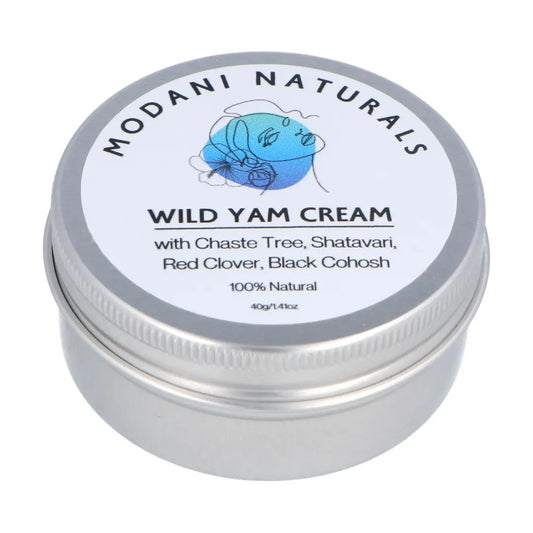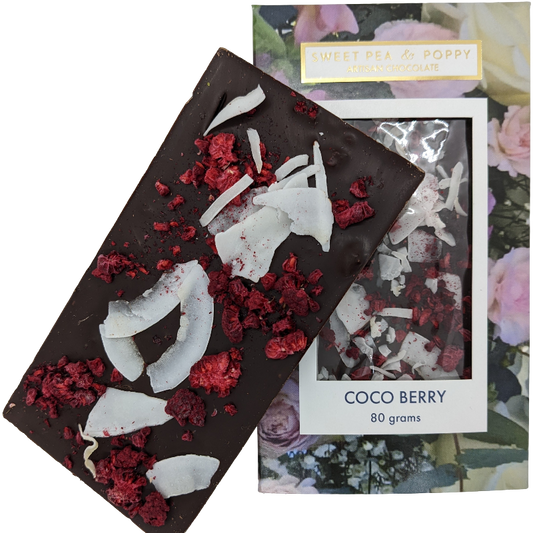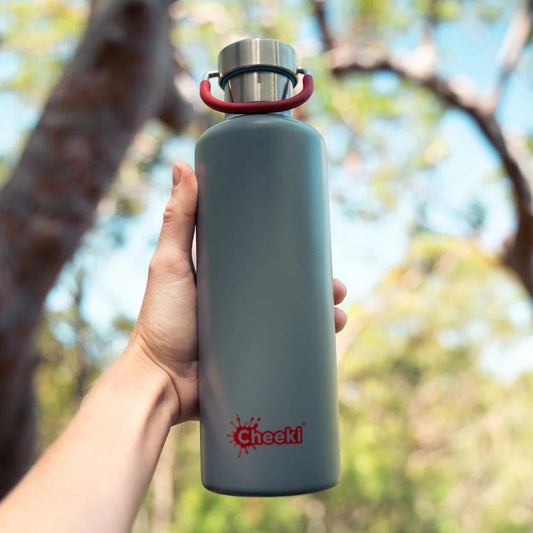
One of the key steps to radiant, healthy skin is regular exfoliation to remove dry, dead skin cells. The problem with many store-bought scrubs is that they contain things like plastic microbeads, palm oil or palm-derived ingredients, sodium lauryl sulphate, and synthetic colours, fragrances, and preservatives – ingredients that are no good to anyone or the environment. That's why we recommend opting for exfoliators with natural ingredients, and where you can, reaching for natural exfoliator tools as well. In this guide, we outline the best natural ingredients for exfoliating depending on your skin type and explain how and when to exfoliate.
Why Should We Exfoliate Our Skin?
A regular exfoliation routine will leave your skin looking fresh and healthy. As new skin cells are created in the dermis (the skin's inner layer), the old, dead skin cells are pushed towards the epidermis (the outer layer of the skin). Eventually, these dead skin cells will flake off. However, as we age, the process of cell regeneration slows down and the body is slower to generate new skin cells and shed the old ones. When the old, dead skin cells start to build up on the surface of the skin, it can leave your skin looking dull, rough, and dry. Furthermore, the build-up of dead skin cells can result in the production of excess oil, clogging pores and resulting in blemishes.
Research has shown that the process of removing these dead skin cells also allows your natural moisturising cream to penetrate more deeply, therefore increasing its effectiveness.
How To Exfoliate Your Skin
Before we take a closer look at the best natural exfoliating ingredients, let's unpack how to exfoliate.
Step 1: Pick The Right Exfoliator For Your Skin Type It's important to select an exfoliator that suits your skin type. Some natural ingredients will work to unclog oil, acne-prone skin, while other ingredients will have a gentler, soothing effect that is ideal for those with sensitive skin. More on this in a bit.
Step 2: Prepare Your Exfoliating Tools 
We recommend pairing your natural exfoliant with a natural exfoliating mitt or sponge. You could opt for a natural loofah made from the Luffa aegyptiaca plant. This fruit is deep green in colour and resembles a large cucumber, up to 45cm in length. When the fruit is young and immature, it can be eaten like a cucumber. At this stage, the luffa will not have developed its inner fibrous netting it is commonly grown for. If it is left on the plant to mature, the outer shell will begin to turn brown, and when you shake it you will hear the seeds rattling. If you soak the fruit in hot water for several hours, the skin will easily slip off, revealing a natural loofah sponge. Alternatively, hemp is also a great natural exfoliant. Look to a hemp mitt, like
this EcoMax one, that is hand-knitted, naturally anti-bacterial, and biodegradable.
Step 3: Start Scrubbing (Gently) Apply the exfoliant onto the skin, grab your exfoliating mitt or sponge and gently massage the product into the skin for about 30 seconds using small, circular motions. Use lukewarm water to rinse off the scrub. Avoid very hot water — this will irritate the skin. You should never exfoliate on an open wound, cut, or sunburn.
Step 4: Rehydrate With Some Moisturiser Exfoliating can leave the skin feeling a bit dry and sensitive, so it's important to moisturise afterward. This will help to rehydrate the skin. You can find natural, sustainable body moisturisers
here and facial moisturisers
here.
When To Exfoliate In Your Skincare Routine
We recommend exfoliating after you cleanse your skin so that you have a clean, fresh slate to work with. Keep in mind that while regular exfoliation is important, it is just as important not to go overboard. Limit exfoliation to once a week at the most. Over-exfoliated skin will be dry, irritated, and sometimes painful.
Best Exfoliators For Sensitive Skin
For sensitive skin types, we recommend looking at ingredients such as:
Cacao
Raw cacao contains high levels of antioxidants that help to repair damaged skin, as well as soothe redness, and nourish dehydrated skin.
Honey
Honey has natural anti-bacterial and anti-inflammatory properties, making it ideal for people with skin that is prone to irritation.
Oatmeal
Oatmeal naturally fights inflammation and has been used for centuries to soothe itchy, sensitive skin.
Rosehip Seed
Rosehip is a gentle ingredient that is well-tolerated by people with eczema or sensitive skin types. It is rich in antioxidants, so it can help to reduce skin irritation and inflammation.
Ground Pumice
Pumice is a type of volcanic rock that is high in naturally occurring minerals, such as magnesium, iron, silica, and oxygen.
Pumice stone is great for keeping feet and elbows nice and smooth, but it can be too abrasive to use beyond those areas.
Ground pumice on the other hand provides much more gentle exfoliation and is suitable to be used on your face and the rest of your body.

Our Top Product Picks:
-
Ready-Made Product – The Simple As That Exfoliant. This is a gentle scrub that keeps things simple by combining rice powder with sea salt and cacao. These ingredients work to remove dead skin cells and makeup residue, as well as infuse the skin with antioxidants to leave you glowing. These ingredients are mild enough to be used on sensitive skin types.
- Ready-Made Product – The Dindi Naturals Face Exfoliant. This product contains rosehip seeds that gently cleanse and detoxify the skin. Olive leaf extract is also a key ingredient, which works to soothe and hydrate the skin.
-
DIY Scrub – Pumice And Clay Exfoliant. This scrub is gentle enough to be used on the face, neck, and decolletage.
Best Exfoliators For Dry Skin
For dry skin types, look to the following exfoliating ingredients:

Salt
Certain salts, including
Murray River Salt Flakes and
Magnesium Salts, are full of trace minerals that are effective in rejuvenating skin, stimulating cell growth, and helping your skin retain moisture. A salt scrub is great for dry skin. As salt can be quite coarse, we recommend using a salt scrub on your body only, not your face.
French White Clay
This natural ingredient is a gentle clay that contains high levels of silica, which helps to nourish and hydrate the skin. It also doesn't pull oil out of the skin like other clays, which makes it perfect for dry skin types.
Sugar
Sugar scrubs are very effective for dry skin types. This ingredient works to loosen dead skin cells and can be particularly useful in areas prone to dryness such as the elbows, knees, and heels. Sugar scrubs are also great for preventing dry patches on the hands or lips. Our Top Product Picks:
- Ready-Made Product – The Rasasara Skinfood Exfoliant & Mask. This exfoliant contains french white clay, grains, and herbal powders that remove toxins and dead skin cells. It is best suited to dry or maturing skin.
- Ready-Made Product – The Butt Naked Chai Lip Scrub. Made from brown sugar, sweet almond, and coconut oils, this scrub exfoliates and rehydrates chapped lips.
- DIY Scrub – You could easily make your own at home by mixing your choice of salt (the abovementioned salts are recommended over regular table salt) with your favourite oil (olive, coconut, or jojoba oils would be fantastic options) to make a paste. In circular motions, gently massage into your skin, avoiding your face, and rinse.
Best Exfoliators For Oily Skin
If you're prone to oily or clogged skin, opt for the below natural exfoliants:
Bergamot Oil
Bergamot oil has anti-bacterial, anti-inflammatory, and analgesic properties and helps to unclog pores, making it ideal for sore and aggravated acne-prone skin.
Lemon Oil
Lemon oil is ideal for oily skin types as it actually helps to regulate the skin's natural production of oils. It also soothes inflamed and irritated skin.
Cucumber
Cucumbers contain astringent properties and also have a cooling effect, which is particularly effective when used on painful pimples and acne.
Ground Coffee
Ground coffee can help to unplug oily pores. Coffee is packed full of antioxidants and is a great natural exfoliant as it gently removes dead skin cells and stimulates blood flow. This in turn help to brighten skin and even minimise the appearance of cellulite (temporarily).
Coconut Oil Soap
Coconut oil can help to reduce the bacteria that causes acne, as well as soften blackheads and whiteheads and clear out your pores.

Our Top Product Picks:
- Ready-Made Product – The Miessence Garnet Exfoliant. This scrub contains lemon, bergamot, and orange essential oils which work to reduce inflammation and excessive oil production in the skin. These ingredients are also antiseptic which will help with painful acne wounds.
- Ready-Made Product – The Corrynne's Fuller's Earth Exfoliating Face Wash with Pumice. This exfoliant is designed to reduce blemishes and draw out impurities. It contains coconut soap, which dissolves excess oils in the skin.
DIY Scrub – This
Coffee & Coconut Body Scrub uses ground coffee to unblock pores and stimulate blood flow through the skin. Discover all of our DIY body scrub recipes
here. You can also shop our extensive range of ready-made natural
body and
facial exfoliants.
 One of the key steps to radiant, healthy skin is regular exfoliation to remove dry, dead skin cells. The problem with many store-bought scrubs is that they contain things like plastic microbeads, palm oil or palm-derived ingredients, sodium lauryl sulphate, and synthetic colours, fragrances, and preservatives – ingredients that are no good to anyone or the environment. That's why we recommend opting for exfoliators with natural ingredients, and where you can, reaching for natural exfoliator tools as well. In this guide, we outline the best natural ingredients for exfoliating depending on your skin type and explain how and when to exfoliate.
One of the key steps to radiant, healthy skin is regular exfoliation to remove dry, dead skin cells. The problem with many store-bought scrubs is that they contain things like plastic microbeads, palm oil or palm-derived ingredients, sodium lauryl sulphate, and synthetic colours, fragrances, and preservatives – ingredients that are no good to anyone or the environment. That's why we recommend opting for exfoliators with natural ingredients, and where you can, reaching for natural exfoliator tools as well. In this guide, we outline the best natural ingredients for exfoliating depending on your skin type and explain how and when to exfoliate.
 We recommend pairing your natural exfoliant with a natural exfoliating mitt or sponge. You could opt for a natural loofah made from the Luffa aegyptiaca plant. This fruit is deep green in colour and resembles a large cucumber, up to 45cm in length. When the fruit is young and immature, it can be eaten like a cucumber. At this stage, the luffa will not have developed its inner fibrous netting it is commonly grown for. If it is left on the plant to mature, the outer shell will begin to turn brown, and when you shake it you will hear the seeds rattling. If you soak the fruit in hot water for several hours, the skin will easily slip off, revealing a natural loofah sponge. Alternatively, hemp is also a great natural exfoliant. Look to a hemp mitt, like this EcoMax one, that is hand-knitted, naturally anti-bacterial, and biodegradable. Step 3: Start Scrubbing (Gently) Apply the exfoliant onto the skin, grab your exfoliating mitt or sponge and gently massage the product into the skin for about 30 seconds using small, circular motions. Use lukewarm water to rinse off the scrub. Avoid very hot water — this will irritate the skin. You should never exfoliate on an open wound, cut, or sunburn. Step 4: Rehydrate With Some Moisturiser Exfoliating can leave the skin feeling a bit dry and sensitive, so it's important to moisturise afterward. This will help to rehydrate the skin. You can find natural, sustainable body moisturisers here and facial moisturisers here.
We recommend pairing your natural exfoliant with a natural exfoliating mitt or sponge. You could opt for a natural loofah made from the Luffa aegyptiaca plant. This fruit is deep green in colour and resembles a large cucumber, up to 45cm in length. When the fruit is young and immature, it can be eaten like a cucumber. At this stage, the luffa will not have developed its inner fibrous netting it is commonly grown for. If it is left on the plant to mature, the outer shell will begin to turn brown, and when you shake it you will hear the seeds rattling. If you soak the fruit in hot water for several hours, the skin will easily slip off, revealing a natural loofah sponge. Alternatively, hemp is also a great natural exfoliant. Look to a hemp mitt, like this EcoMax one, that is hand-knitted, naturally anti-bacterial, and biodegradable. Step 3: Start Scrubbing (Gently) Apply the exfoliant onto the skin, grab your exfoliating mitt or sponge and gently massage the product into the skin for about 30 seconds using small, circular motions. Use lukewarm water to rinse off the scrub. Avoid very hot water — this will irritate the skin. You should never exfoliate on an open wound, cut, or sunburn. Step 4: Rehydrate With Some Moisturiser Exfoliating can leave the skin feeling a bit dry and sensitive, so it's important to moisturise afterward. This will help to rehydrate the skin. You can find natural, sustainable body moisturisers here and facial moisturisers here.
 Our Top Product Picks:
Our Top Product Picks:

 Our Top Product Picks:
Our Top Product Picks:



































